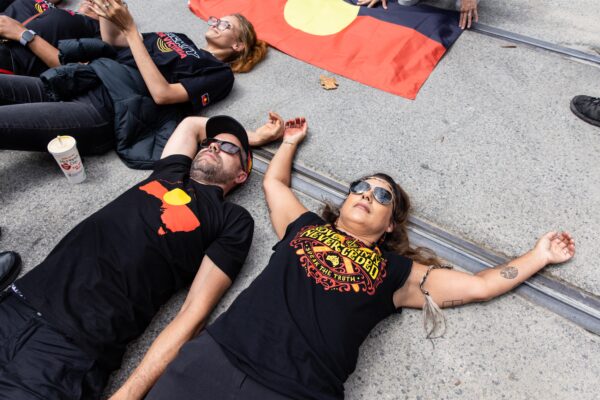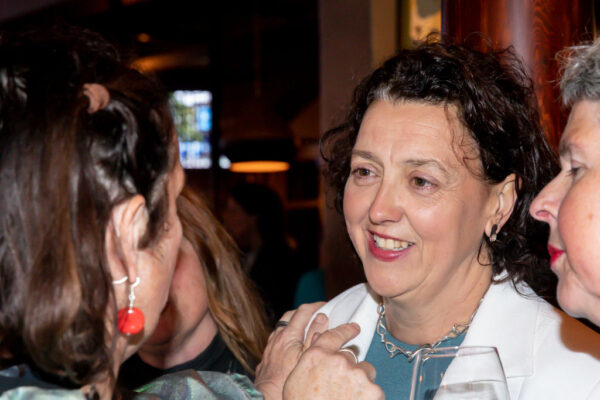Many Indigenous Australians who disagree with the left’s proposed “Uluru Statement from the Heart” have been “ignored or bullied,” contrary to the narrative that the statement represents a consensus among Indigenous leaders, an Australian senator has warned.
The Uluru Statement is a 2017 petition by a group of Aboriginal leaders who called for constitutional reform in Australia to improve Indigenous people’s political representation.
It has since been widely endorsed by governments at both state and federal levels, with the Albanese government moving to hold a referendum for the Indigenous Voice to Parliament later this year.
In early February, leaders of eight states signed a joint statement to declare their support for the Voice at their Council for the Australian Federation meeting. South Australia on Feb. 24 passed the First Nations Voice Bill, moving the state closer to having an Indigenous Voice in parliament, while the Queensland government also introduced an Indigenous treaty last week.
But Country Liberal Senator Jacinta Price, herself an Indigenous Australian, argued on Feb. 25 that the Uluru statement didn’t reflect the diversity of viewpoints among the Indigenous community, warning that opposing voices are being sidelined in the process.
The statement is aimed at benefiting the elites rather than ordinary Aboriginal Australians, Price alleges, adding that Uluru in the statement name was only “used as the backdrop for maximum manipulative impact.” Uluru carries spiritual and cultural significance for Indigenous Australians.
“There were many who disagreed with the process, and [were] ignored or bullied,” she wrote in a comment on Facebook.
Disputes Over ‘The Uluru Statement’
The Uluru statement, which was introduced at the First Nations National Constitutional Convention in 2017, proposed establishing an Indigenous Voice in the parliament to advise the government on Indigenous-related matters, treaty-making and a truth-telling process.
The move’s intention is that by enshrining an Indigenous political voice now in the Constitution, this can atone for the treatment of those indigenous individuals in the past who were “systematically discriminated” against during British colonisation.
Those in favour of changing the Constitution argue that the race of the “original owners of the country” should be given a voice on matters that directly affect them.
According to the “From the Heart” website, the Uluru statement “represents a historic consensus of Indigenous leaders in seeking constitutional change to recognise First Australians through a Voice to Parliament.”
Yet, Price noted that the statement was signed by 250 individuals who attended the Convention “by invite only,” and that those present who walked out over disagreements with the proposal were “threatened with tribal punishment, which means violence.”
The Warlpiri-Celtic woman said there are many Indigenous language groups who do not have a signature on the Uluru statement, including her Warlpiri people.
“But naïve white fellas believe the nonsense peddled, and Aboriginal people from the bush are exploited by the elites for their own agenda,” she added.
“This is why I and many other Aboriginal Australians say ‘No’ to this constitutional change that only seeks to empower the elite while exploiting the most vulnerable.”
“Don’t destroy our democracy through naïveté and emotional blackmail!”
The senator has previously noted that political views among Indigenous Australians are as diverse as for other groups of Australians and not homogenous.
Details Still Unclear
Monique Ryan on May 21, 2022 in Melbourne, Australia. (Sam Tabone/Getty Images)
The senator’s comment came as a reply to a comment supportive of the Uluru statement under a social media post by the teal independent MP Monique Ryan on Feb. 25. However, the original comment was later deleted, as well as Price’s reply comment.
Ryan, the Climate 200-backed MP who won the seat of Kooyong, Victoria, previously held by former Treasurer Josh Frydenberg, announced in her post she would hold an information session about the Voice to Parliament on March 2. That post remains visible on Facebook.
The teal MP will be joined by Aboriginal musician Uncle Bart, National Indigenous officer at the Maritime Union of Australia Thomas Mayo, and co-chair of the First Peoples’ Assembly of Victoria Marcus Stewart.
The post saw mixed reactions from Australians, with one person saying the event had a “line up of inner-city elites,” and others voicing concerns about the details of the Voice and its proposed changes to the Constitution being kept “under wraps.”
So far, the Albanese government has yet to confirm any details about the proposal beyond the Prime Minister’s draft wording of the referendum question and the constitutional amendment on an “Aboriginal and Torres Strait Islander Voice” in July last year.
It is unclear what are the functions, size, and cost of the Indigenous body, as well as how it would benefit the most vulnerable Aboriginal Australians, who would be selected as the representative, what the criteria are, and how “Aboriginal” would be defined.
In a separate comment, Price asked whether Ryan would be including an information night with Indigenous speakers who oppose the Voice to provide her constituents with a “balanced and informed view.” She also asked whether Ryan would be visiting the Alice Springs communities who are struggling amid an alcohol-fuelled crime wave.
Ryan did not respond to the questions.
Prime Minister Anthony Albanese said on Feb. 18 that a “Yes” result to the referendum, to be held sometime between October and December, will “send the message to the world that we are a mature nation; that we are prepared to come to terms with our history and past.”

Newly independent senator Lidia Thorpe, who quit the Greens over the Indigenous voice on Saturday, said Aboriginal people “deserve better than a powerless voice.”
“We need a treaty, we want real power, we want real justice in this country,” she said.
“Everything else we have been offered for the last 200 years has no power. And we’re not settling for anything less.”
